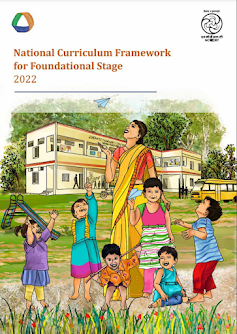Highlights of the newly launched National Curriculum Framework for Foundational Stages
The National Curriculum Framework (NCF) for foundational stage education was released by the Union minister for education last month. The good news for Multilingual Education is that the NCF highly recommends the use of the mother tongue as a medium of instruction in the primary and the pre-primary grades for both public and private schools: “The home language serves as a facilitator for all learning and enables children to form connections with prior learning and home learning.” (P 74).
The NCFs are detailed guidelines based on which school syllabi undergo revisions. The first NCF, in 1975, called the mother tongue the child’s “most natural medium of communication.” The NCF 2000 promoted the use of the mother tongue not just in primary school but beyond, throughout one’s education. NCF 2005 said that Early Childhood Care and Education (ECCE) would “normally be in the child’s ‘first’ language, or home language” should be used for education. Now finally we have reached the point where the NCF for foundational stage education fully recommends the use of mother tongue in both public and private schools till eight years of age.
The National Education Policy (NEP) 2020 recommends the development of National Curriculum Frameworks (NCF) in four areas- School Education, Early Childhood Care & Education (ECCE), Teacher Education and Adult Education. (See the NCF Homepage for details.) The new NCF also claims that using as a medium of instruction a “new or unfamiliar language” at a young age is “reversing the entire learning process”. It claims that teaching in a “new” language negates the “foundational experiences, skills, and learning that the child has already accumulated” (Sec. 3.1, D2, pg. 74). The document also says that the mother tongue offers a “scaffolding” upon which the student can build fluency in other languages in the future. (Sec. 1.5/ 1.5.2, pg. 46) (NCF2022.PDF)
According to this Indian Express article, the NCF 2022 does not provide a detailed explanation for introducing English. It does say that English could be taught as one of the second languages at the foundational level without specifying the grade.
The textbooks for the foundational stage are expected to be prepared on the basis of NCF by January 2023. Yet the framework recommends against prescribing the use of textbooks for ages three to six. The Hindustan Times quotes the new NCF as saying, “…children of this age should not be burdened with textbooks,” . For ages 3 to 6, NCF recommends the use of additional material such as worksheets, children’s literature and audio-visual resources. It also recommends that the materials used in the classroom foster diversity and gender equality.
The NCF for foundational stages 2022 is an important step taken toward implementing the NEP 2020. The challenge remains, however, that since most states have their own school boards, the practical implementation of the NCF, in the final analysis, depends on the state governments.
Regards,
Karsten van Riezen and Upasana Lepcha
Resources:
1.Indian Express article on: Use of mother tongue in foundational education, now and earlier
2. https://thewire.in/education/national-curriculum-framework-regional-languages
3.https://ncert.nic.in/pdf/NCF_for_Foundational_Stage_20_October_2022.pdf
Photo Credit: https://ncert.nic.in/pdf/NCF_for_Foundational_Stage_20_October_2022.pdf Front cover
